2021 Harley-Davidson Sportster S Quick Test
Words by Kris Hodgson, Images by Mark Watson, Incite Images
So, first chance to test ride Harley-Davidson’s new Sportster S, with a short loop from Sydney’s CBD to Hunters Hill and some photo ops along the harbour, that’s about 30 km in total so very much just dipping of the toes into the new machine as far as impressions go. Exciting stuff anyway, considering how big a move away from tradition the Sportster S is. For a full test from the American launch see Rennie’s Harley-Davidson Sportster S Review (link).
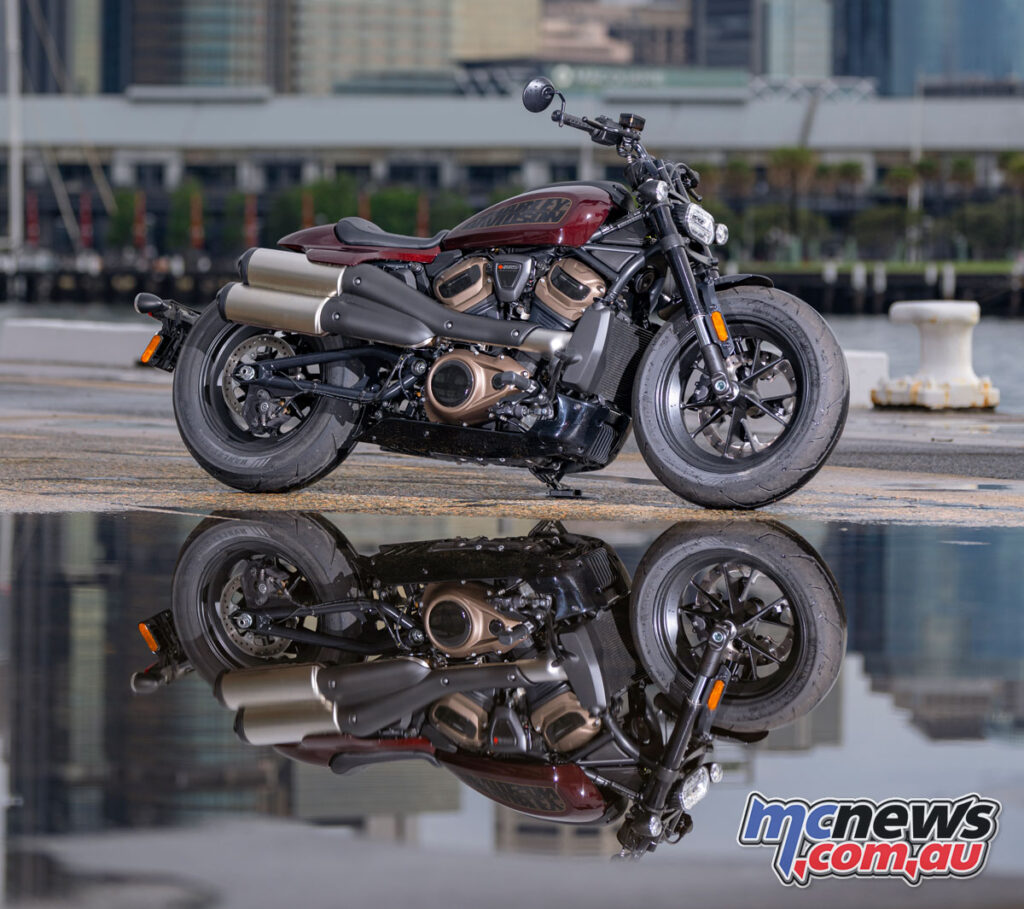
I’m no hardcore Harley fan either for reference, I like most types of bikes and primarily I want to know two things: how it goes and how it looks. Tradition is cool, but I’m young(ish) and not invested enough in any brand to be overly upset when there’s change. As long as a better bike is delivered, of course. I’m just a regular road rider with no major investment in any particular brand over another that rides plenty of contemporary motorcycles.
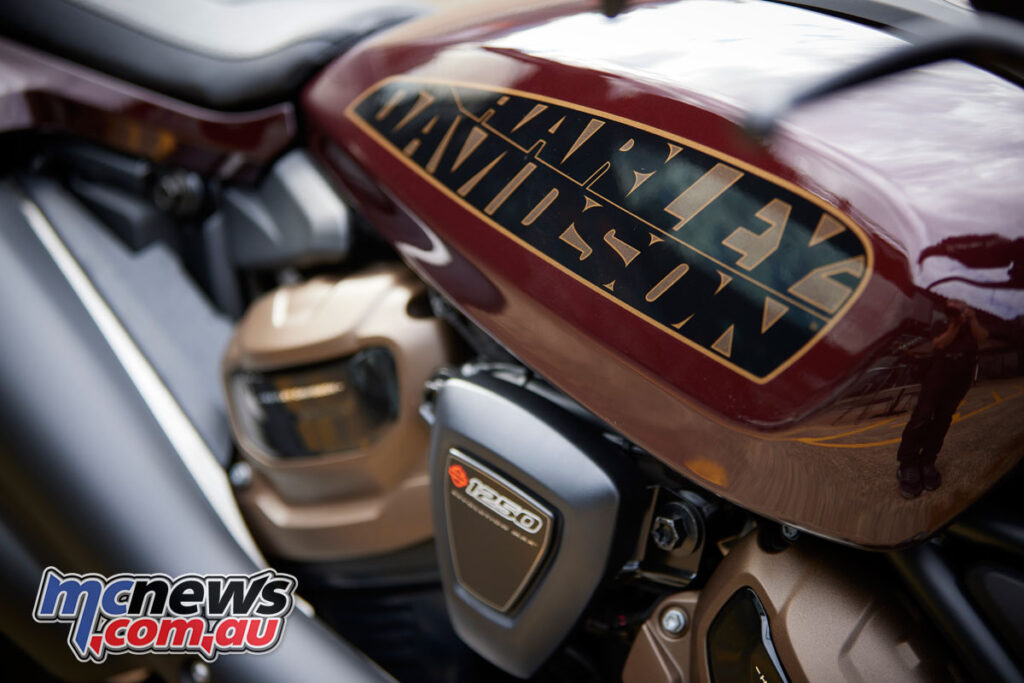
So obviously if the tradition part of Harley-Davidson is huge for you, this may not be a helpful perspective, but here are my initial thoughts on the new Sportster S, after a fairly quick ride. Also keep in mind I haven’t ever ridden the Pan America with which it shares the Revolution Max powerplant, so this was all-new to me. Trev rode and reviewed the Pan America earlier in the year, and we will publish Wayne’s thoughts on Harley’s adventure-touring option shortly. But, for now let’s get back to the new Sportster S…
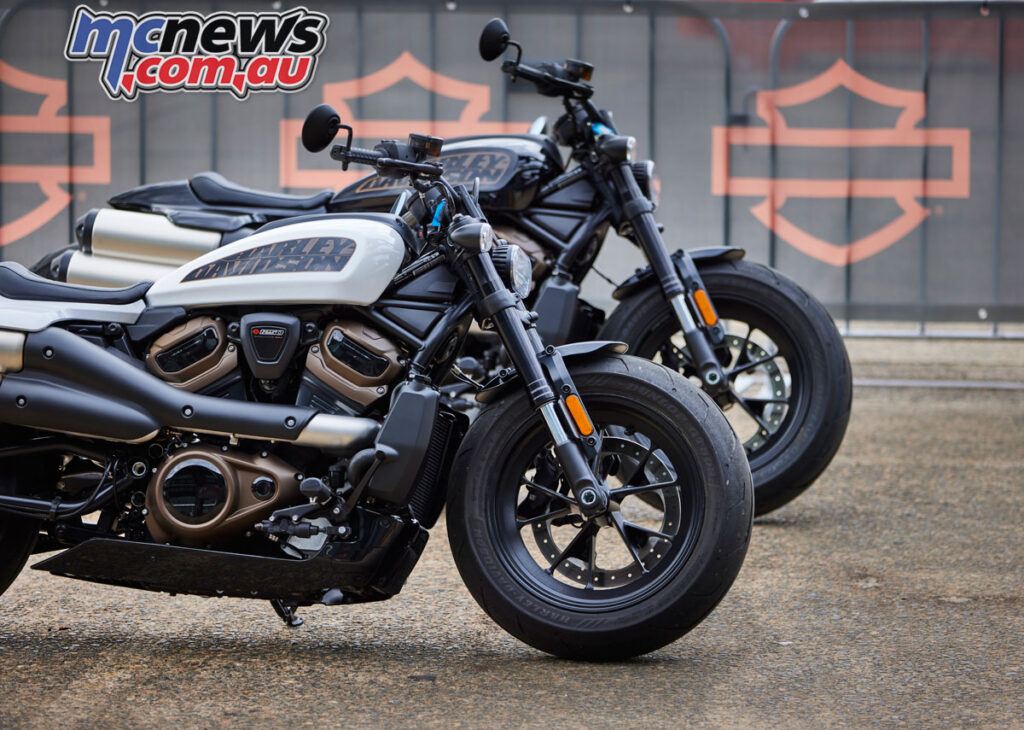
At first glance I definitely see the family resemblance, it’s kind of inarguable to me on that front and I didn’t really go any deeper than that. It looks tough, it looks like a Harley, it looks like a Sportster, tick. When you flick that starter button there’s a welcome roar into life that turns into a growling idle. Not everyone’s a total victim to Euro5 it would seem…
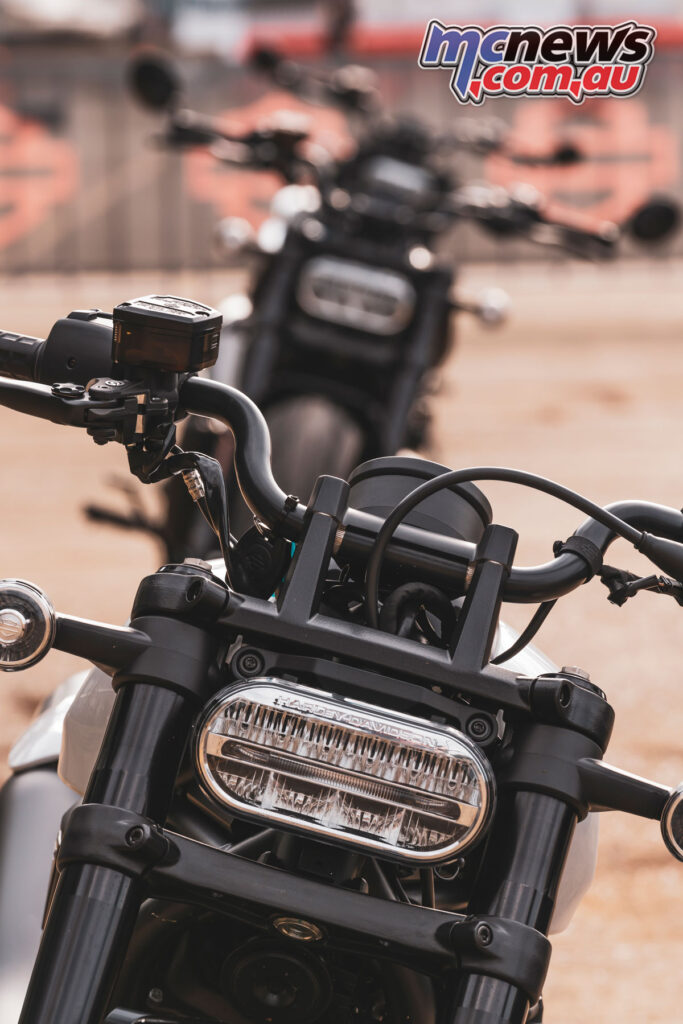
There’s some pretty busy switch-blocks, a traditional (non-Harley) indicator toggle and a TFT display housed in a round dash, offering a break from all the rectangular units. A mode button allows you to revolve through the Sport, Road and Wet maps too, even on the move, with a lot more settings that I didn’t have a chance to fully explore on the short local launch.
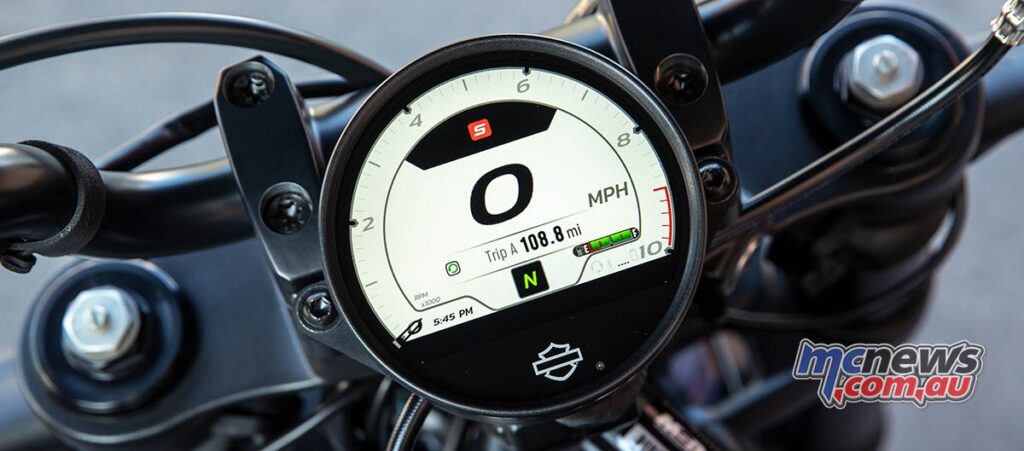
Points of note at a glance? Beefy USD forks, Brembo brakes, forward controls, swingarm mounted fender. Jumping on board that 750 mm seat height is super inviting and the 228 kg weight is beautifully balanced, although being a cruiser – long and low – that’s the expectation, with stability and a low CoG the norm for the category. The last Harley I tested was the FXDR 114 though, and the Sportster S is much… sportier, and more accessible.
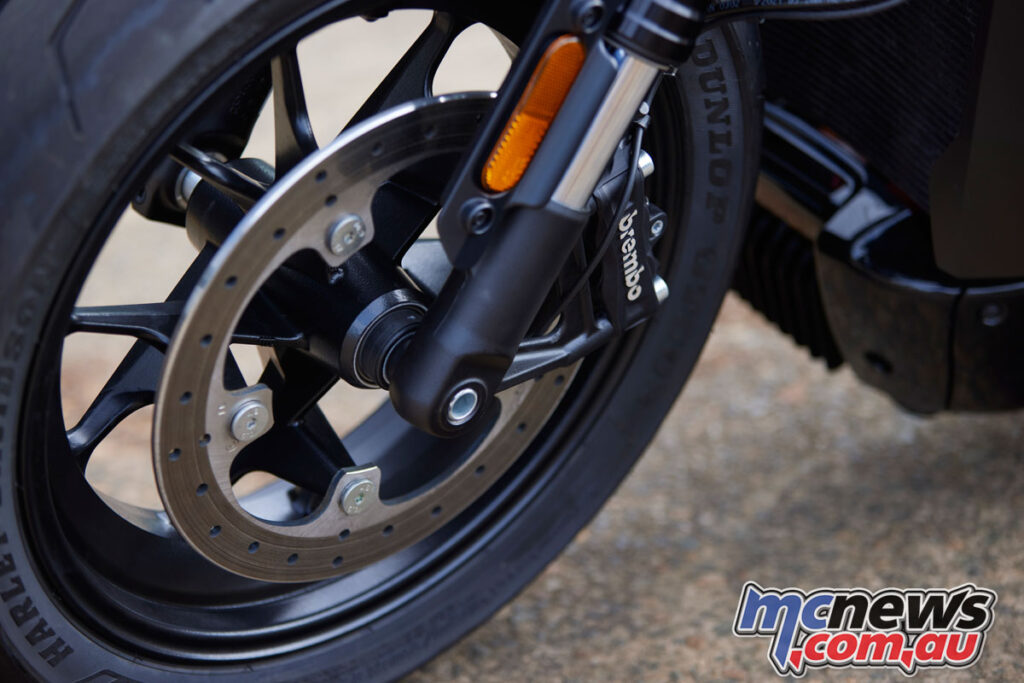
Heading for our loop out of the city I set mode to Road and head off, the Rev Max engine produces power much smoother than I expected, but still with a gruff twinny edge. There’s a little hesitation in the fuelling opening the throttle at times, but torque comes on nicely with gear changes solidly clunking into the next gear, which I felt was fairly Harley. I give it a few minutes in Road and then switch to Sport and that hesitation in the fuelling disappears.
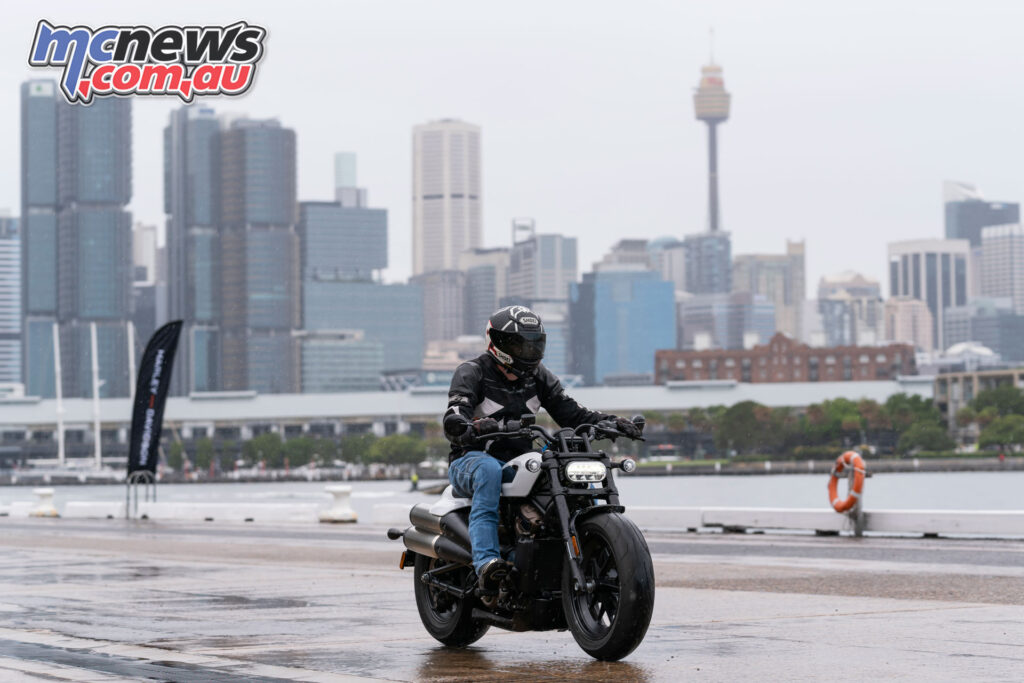
I’ll also be honest, it’s been a while since I’ve ridden a cruiser and leaning the bike over to turn requires a little bit of effort before I settle into the swing of things, which is just basically me being a bit more active with the inputs and adding lean angle to turn. Interestingly at no point did I have a peg down either, and while this was a laid back quick test, I’m interested to see just how much of that 34 degrees of lean angle I can take advantage of given a nice piece of road.
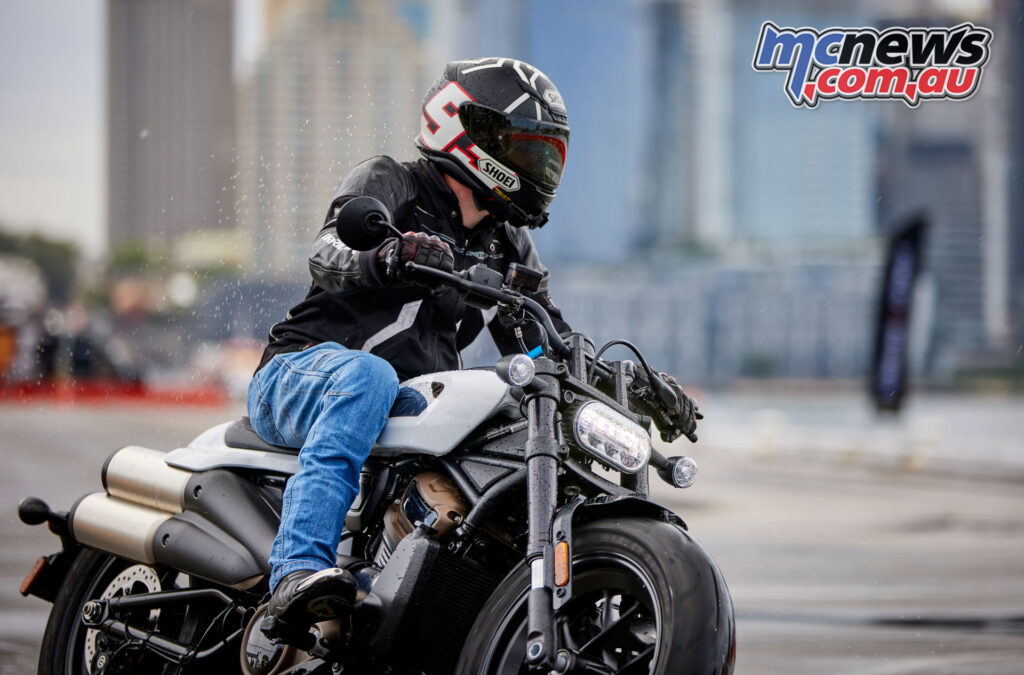
Suspension had been tweaked within standard adjustability for each rider and I’ve got to say I was again impressed. Sydney roads aren’t something I’d ever boast about, with mismatched surfaces, potholes, road snakes and plenty of recent rain hadn’t helped their condition.
That fully adjustable set-up however gobbled up the inconsistencies, tracking well with the HD-Dunlop rubber, with only the really big bumps getting a little harsh at the rear, which with such limited (50 mm) travel available perhaps isn’t surprising. That’s a super-premium ride quality from a cruiser, with the emphasis on ‘for a cruiser’. I didn’t experience the level of pain caused by the rear suspension that Rennie mentions in his test, but with a 30 km loop that may just not have been enough saddle time.
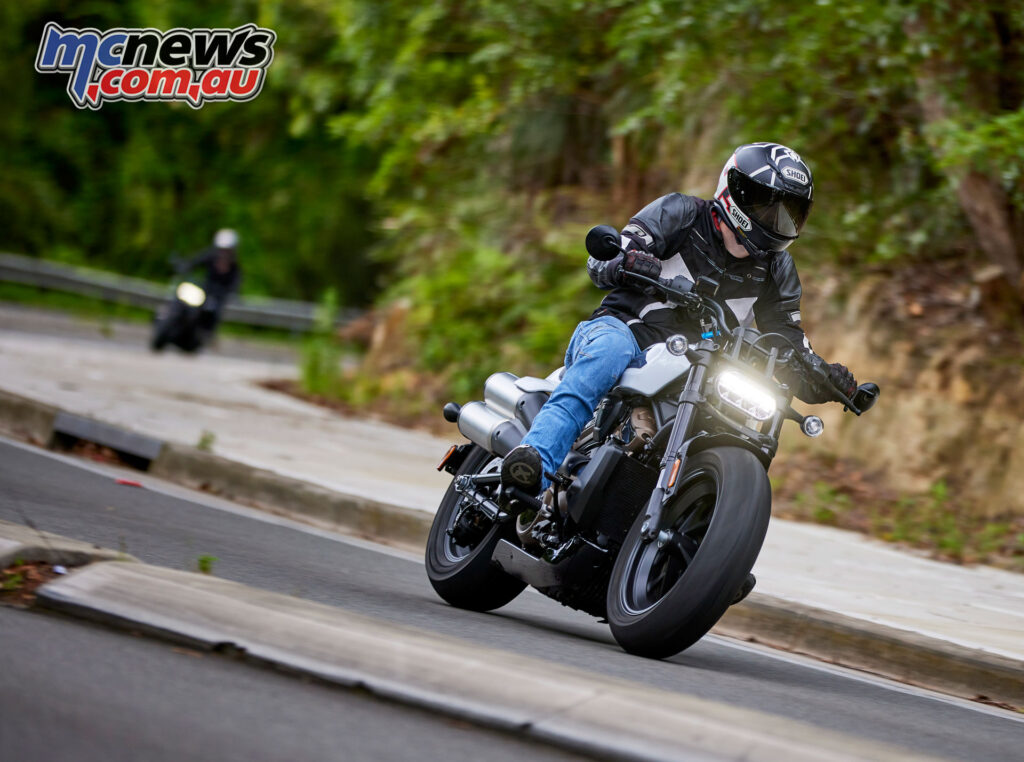
The single 320 mm Brembo front brake provided good power too to wash off speed, without any real dive in the forks, while the rear brake was definitely the weaker of the two which surprised me as atypical for a cruiser. That was another area Rennie criticised, however our test loop wasn’t long enough to really give the brakes a heavy workout as you can imagine, and the rainy conditions probably favoured the bike’s brake set-up.
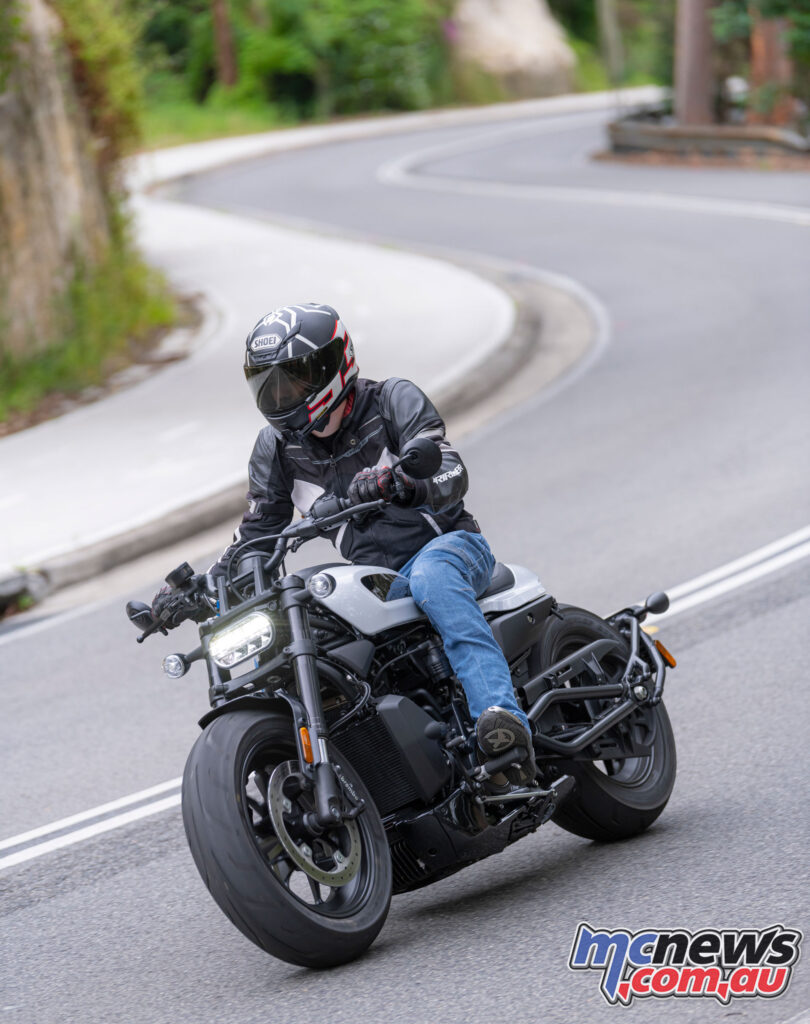
Dropping back a bit and accelerating up to the next rider reveals a willing burst of torque that promises much more fun on a good (preferably twisty) piece of road with no one watching, before getting onto the brakes to wash off that speed easily. Again we’re talking inner city riding here, not a race track. That said, snapping it down through the gears for decel was plenty of fun too and would be my go-to choice when not coming to a rapid stop.
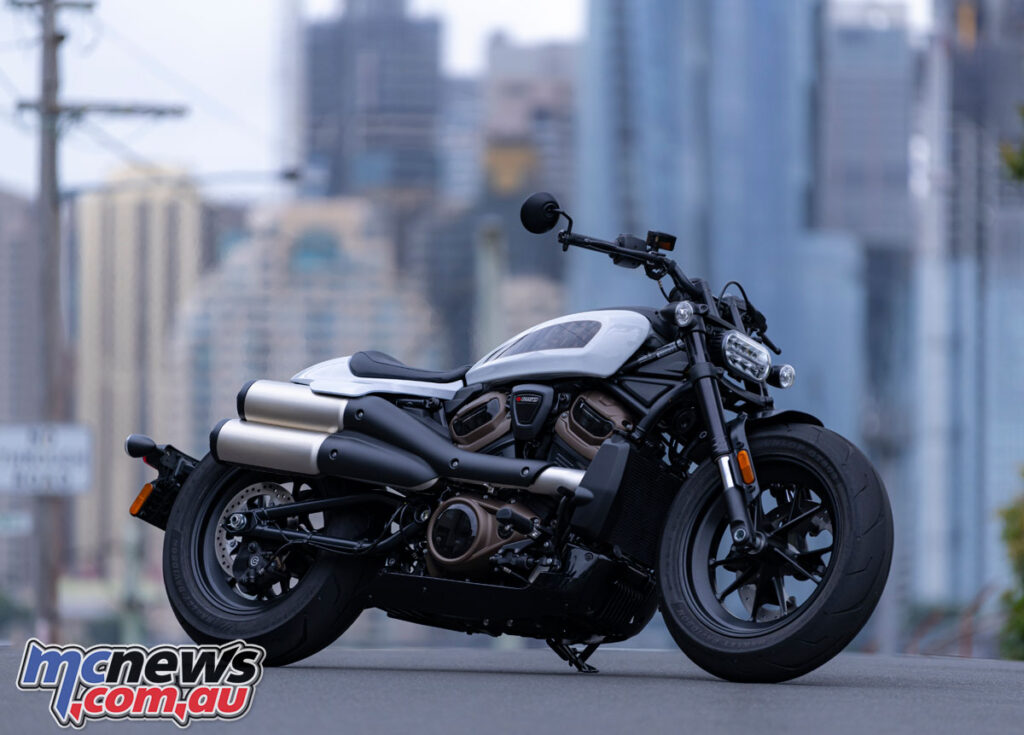
Probably what hit me most was just how easy the Sportster S is to ride. I’d say the older Harleys I’ve ridden were a bit agricultural with how the V-twins felt, where the Rev Max has a lighter, free-er revving feel to it that builds power quickly. A slipper clutch also keeping engine braking smooth. Being a gear or two too high didn’t cause lugging either, just smooth transitions onto acceleration and certainly in Sport mode the fuelling was spot on.
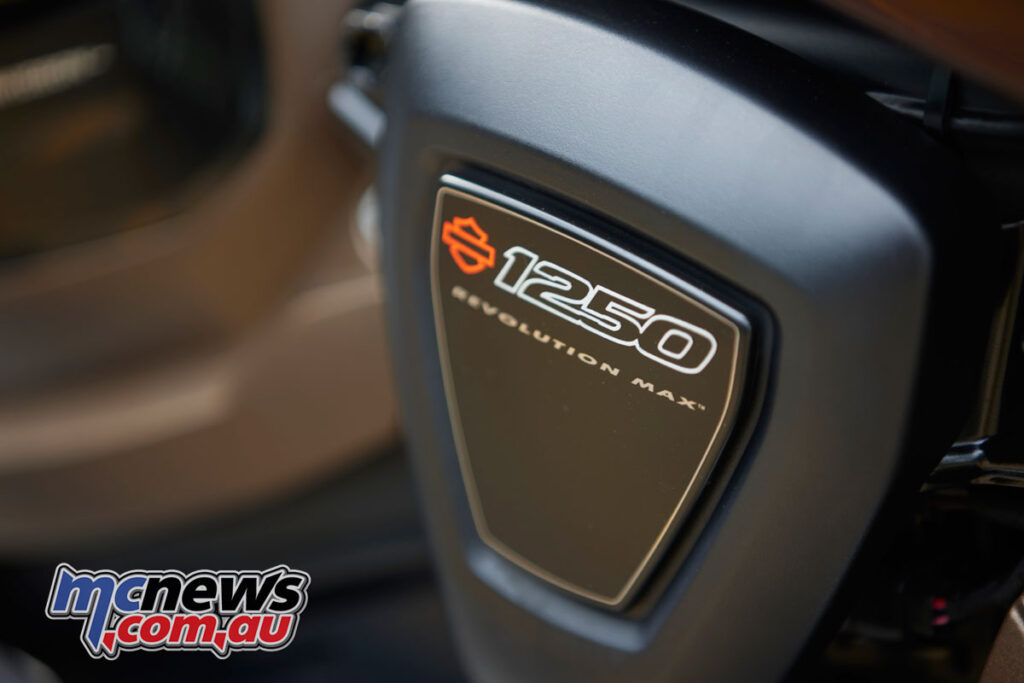
I’m probably on dangerous ground here, but the Rev Max engine really feels high tech, and while some may bemoan some loss of old-school character to reach that, the performance is worth it to me, while still offering a welcome sound track when the rare opportunity appeared to open the throttle more vigorously.
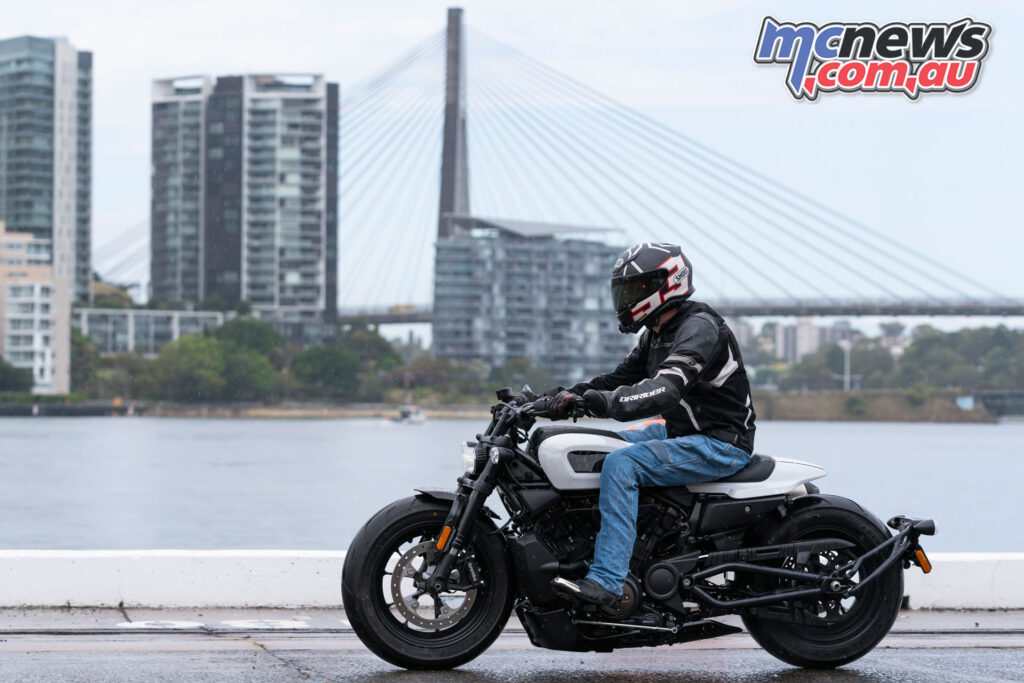
After some photo ops and the rain deciding to rear its ugly wet head, we head back to White Bay Cruise Terminal from where the day was run from. In the slick conditions riding up the bus lane (legally officer, I swear) I had a couple of moments where the rear came around a before the traction control kicked in. Someone’s been cheaping out on that bus-lane paint I’d say, as that was on a steady throttle, with no shenanigans involved, and there’d have been some heat in the tyres.
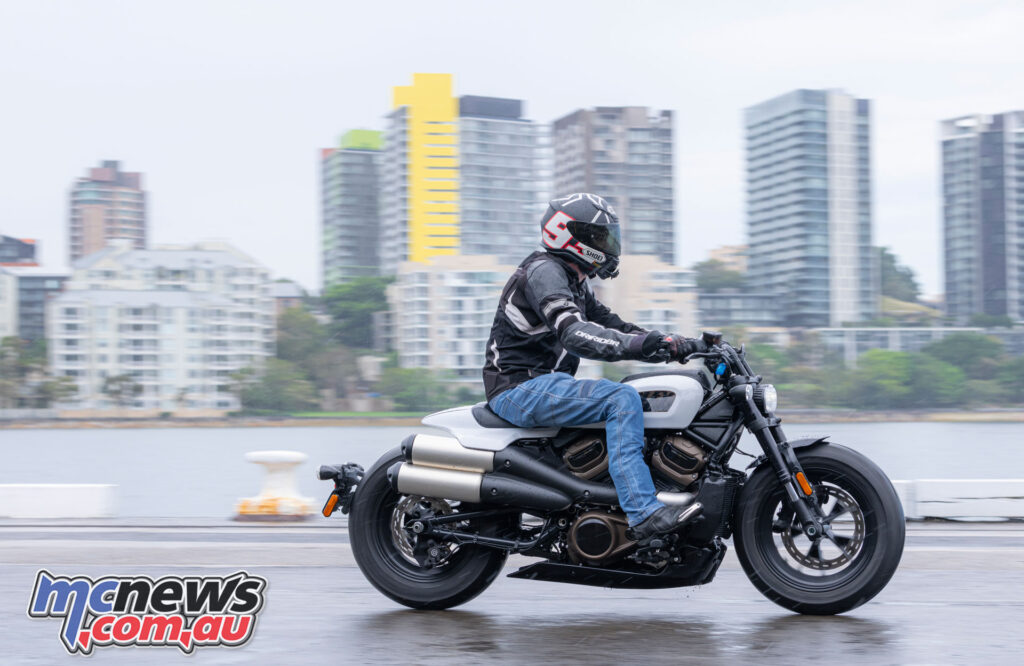
I was of course still in Sport mode which offers the lowest level of intervention, but it obviously kept things in check, for which I was grateful and then switched to Rain mode from that point and had no further issues. I’m not sure that was Rain mode actively kicking in the TC either, with the loss of traction perhaps just hitting a particularly oily patch of road…
Either way, there’s nothing like the back slowly stepping out to add some excitement to your ride, especially when it’s handled with such aplomb. Rain mode does offer a more subdued throttle connection in contrast to Sport, perfect for dodgy road surfaces or oily commutes.
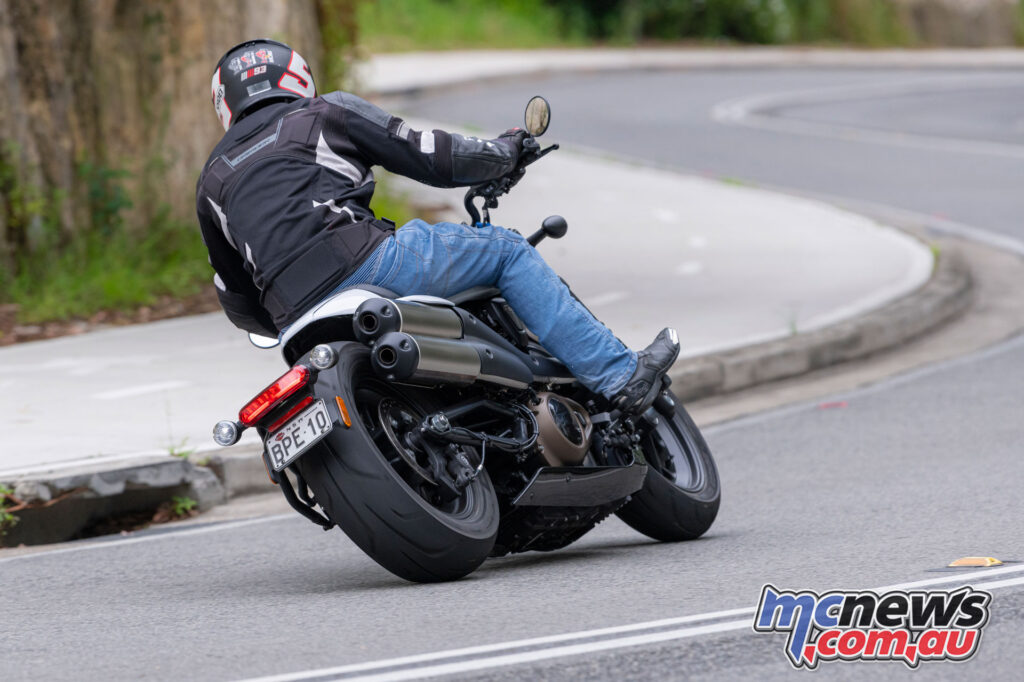
Now this was by no means an in depth test of course, without a proper stretch of highway and more importantly some nice twisty backroads to have a fang along, however it does reveal the slickest Harley-Davidson I’ve had the pleasure of riding.
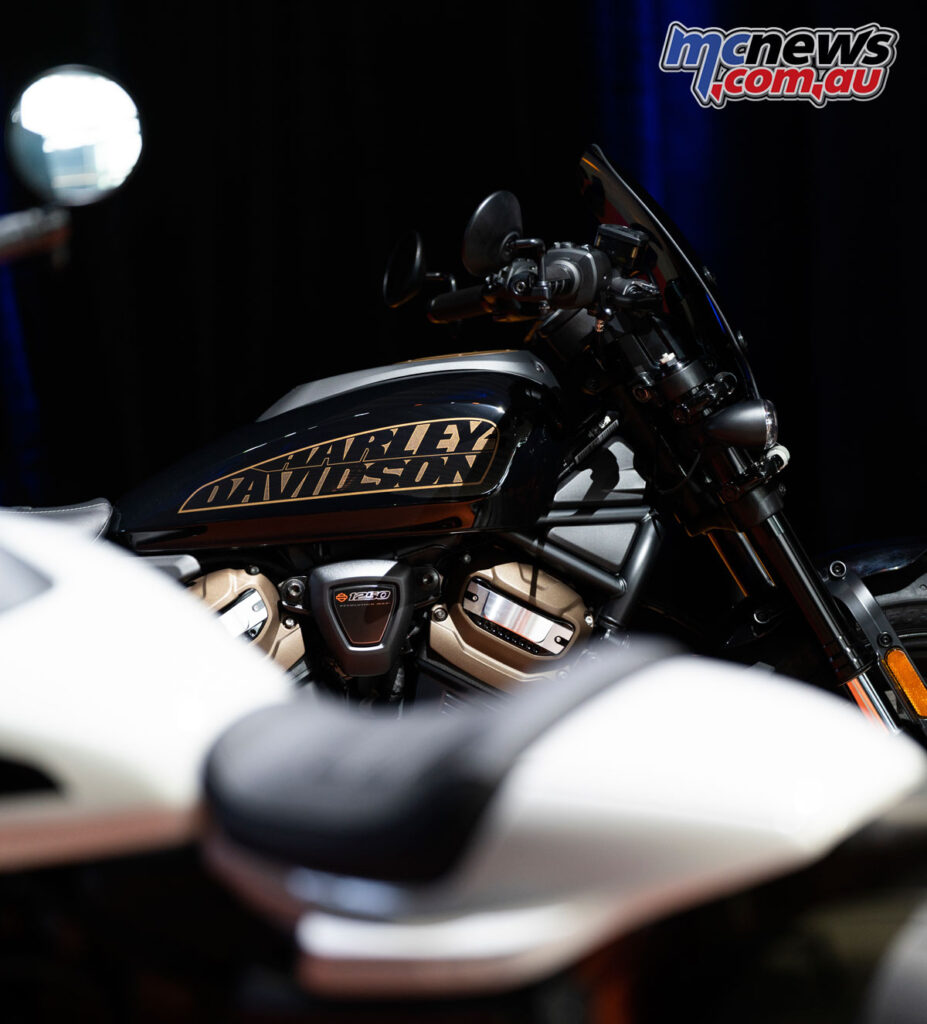
That Revolution Max engine is a gem, and the general specification of the bike is very impressive, with a great ride quality, easy handling and comfortable ergonomics. Those upgrading from a Street 500 for instance are going to be in for one wicked surprise if this is the next bike they choose, while I’d say the Sportster S also really delivers on the performance side of things for your regular rev-heads.
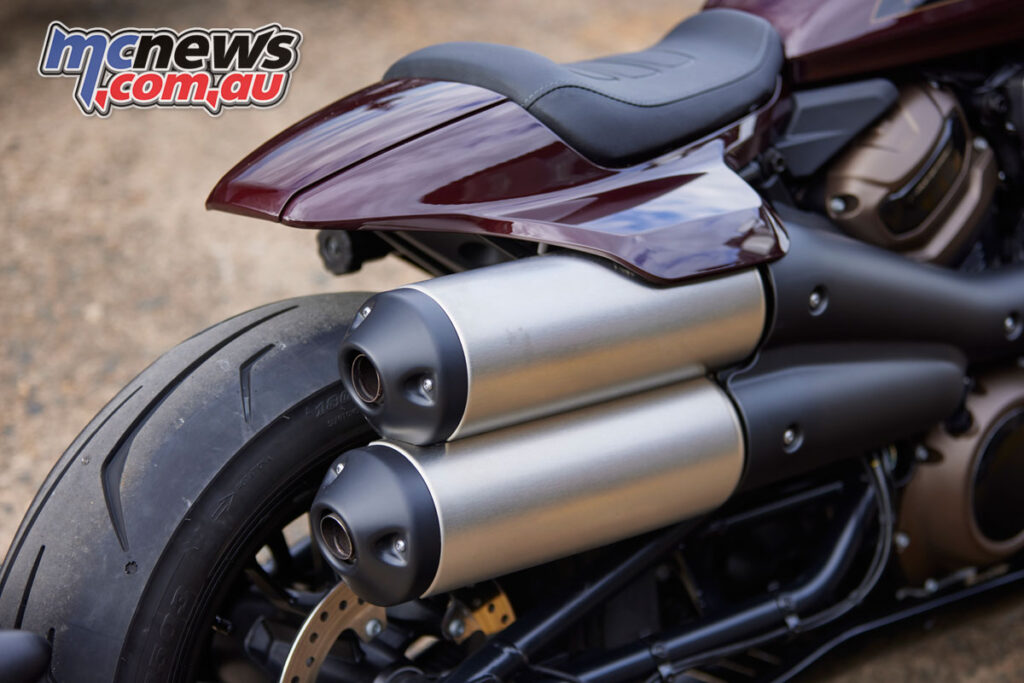
With the wet weather we did discover that the bike’s lack of a rear wheel guard had a tendency to fling water (or road crud in drying conditions) up your back and even onto your helmet to a considerable degree, with the water tending to then run down your back and onto your… ass. That’s definitely not the water-cooling I expected. Adding the pillion seat accessory does add some protection there though.
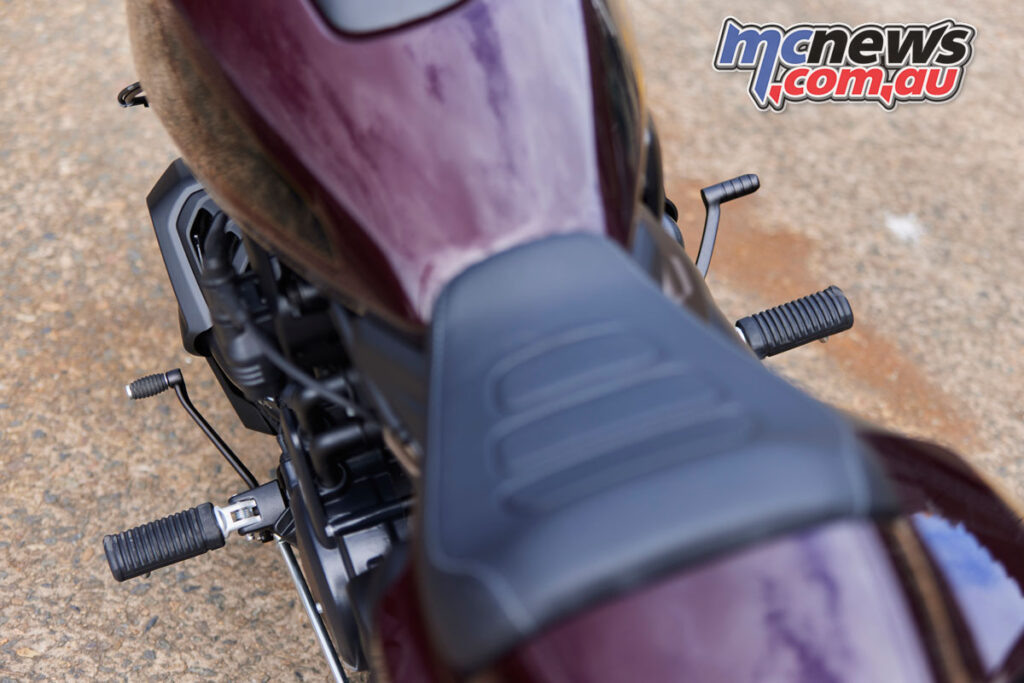
There was also a bit of heat making it through the well shrouded exhaust mid-pipe too, only really noticeable at a standstill when I could feel it under my thigh, with it being a fairly chill day in the 15-20 degree kind of range. To be fair we spent a bit of time in start-stop traffic which probably didn’t help there, but Rennie’s comment regarding it being an issue on a hot day in California doesn’t bode well for Australian summers.
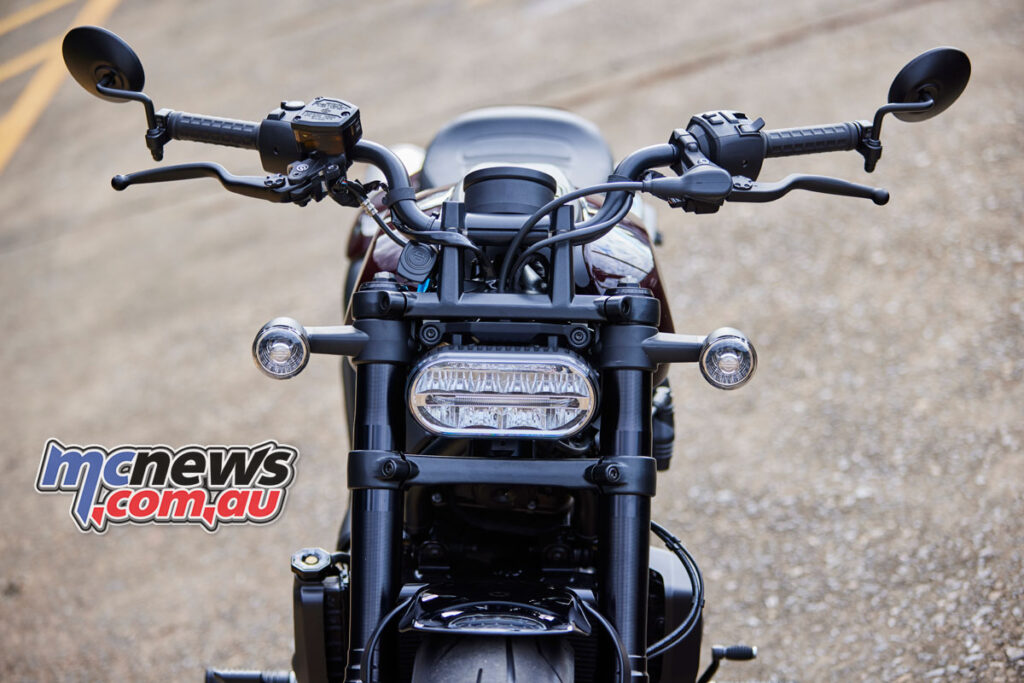
The ‘bar-end mirrors were also a cool standard inclusion and offered decent vision behind, but a big head check for lane changes was very much necessary due to their small field of view, while also needing a glance down to see them. The dash was just within my field of vision with a full face helmet, so should be visible in most lids without looking down.
Overall I think Harley-Davidson are onto a winner here. The new Sportster S offers modern performance and technology which is very much the expectation and honestly I think this bike has the potential to win over many riders who wouldn’t otherwise consider a HD. That’s probably true of the Pan America too, considering they share the same impressive engine architecture.
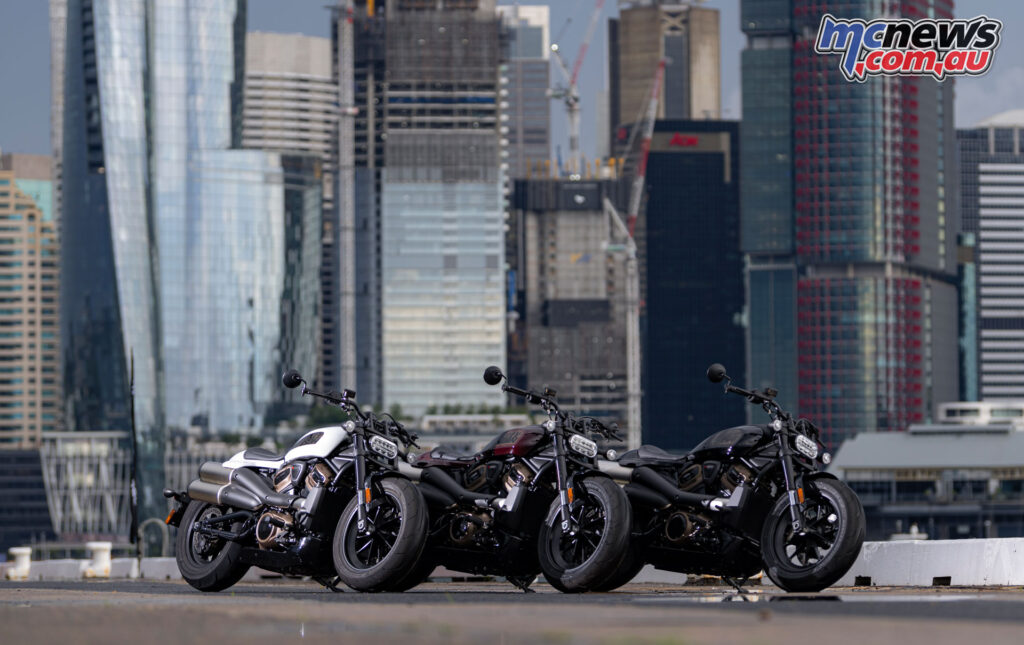
The Sportster S is also well suited to those of smaller stature, and will no doubt make a great transition from a LAMS cruiser for new riders in Australia, although I’m not really sure what the next upgrade would be from there down the line, at this stage.
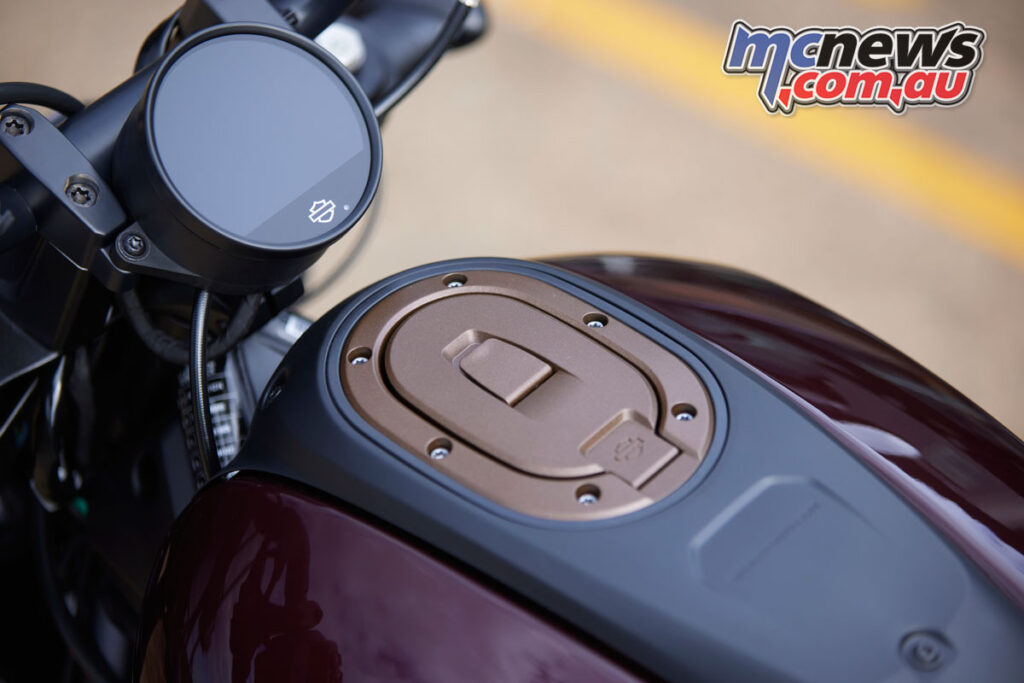
Australian pricing is $26,495 ride-away for the black, with premium colours adding $295 and I can’t help but wish that price tag was a bit lower. Not because I don’t think it’s worth that asking price, but because I reckon there’s a host of younger, less well off riders who could help usher in the new age of Harley-Davidson, but who probably don’t realise what HD have on offer unless they test ride the new Sportster S.
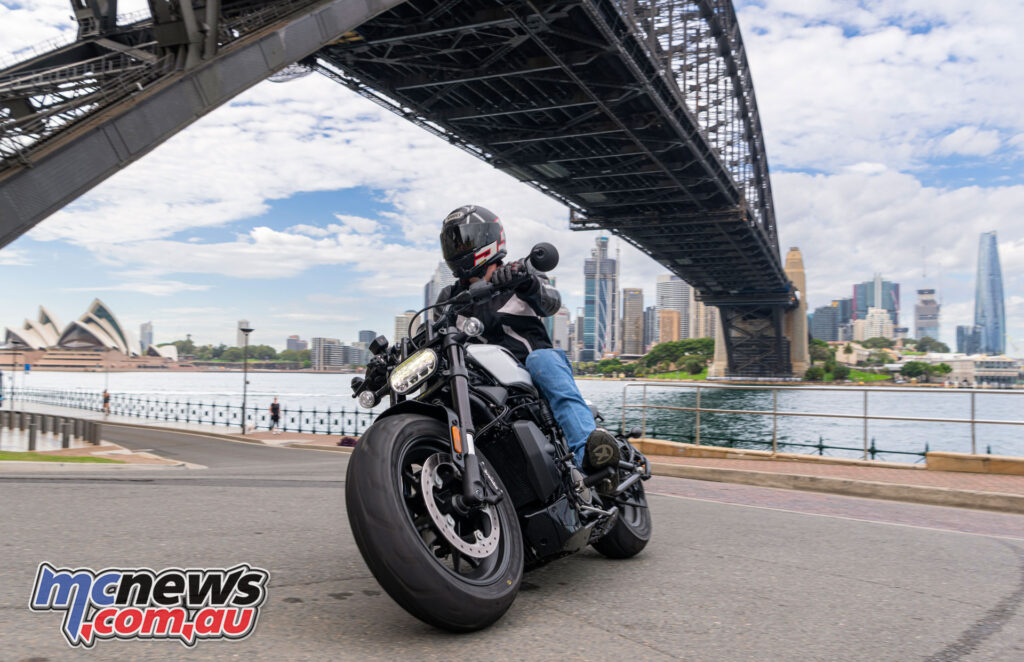
As it stands, my first impression of the Sportster S is of a great machine that supplants the FXDR 114 in my mind, being lighter, sportier, more high tech and offering some staggering performance, and with a more competitive price tag to boot.
For a full run-down on the new Harley-Davidson Sportster S changes in detail, check out the feature from when the model was first announced: Sportster takes a massive leap forward in performance and price.
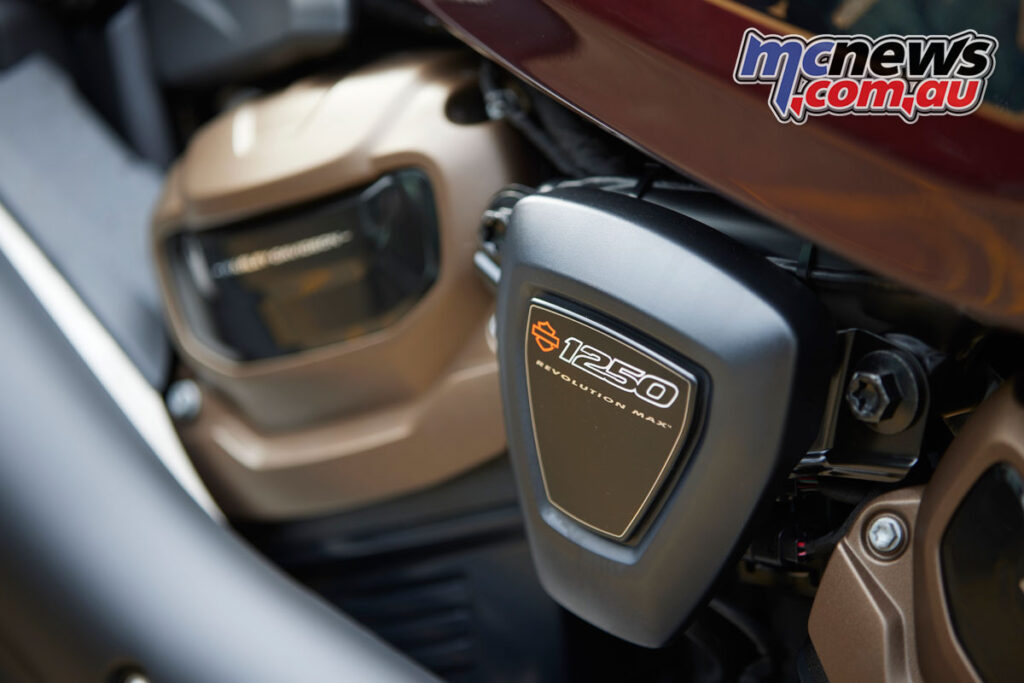
| Harley-Davidson Sportster S Specifications | |
| Engine | Revolution Max 1250T, chain-driven, DOHC, hydraulic self-adjusting lifters, intake & exhaust VVT; four valves per cylinder |
| Bore x stroke | 105 mm x 72.3 mm |
| Displacement | 1252 cc |
| Compression Ratio | 12.0:1 |
| Engine Torque | 94 ft-lb (127 Nm) @ 6000 rpm |
| Power | 121 hp (90 kW) @ 7500 rpm |
| Fuel System | Electronic Sequential Port Fuel Injection (ESPFI) |
| Air Cleaner | Downdraft intake, tuned velocity stacks, washable filter media |
| Exhaust | 2-into-1-into-2; catalyst in muffler |
| Lubrication System | Semi-Dry Sump |
| Primary Drive | Gear, 49/89 ratio |
| Final Drive | Belt, 80/34 ratio |
| Clutch | Mechanical, 8 plate wet, assist & slip, 1090N |
| Transmission | Six-speed |
| Frame | Stressed-member, high strength low alloy steel trellis frame; stamped, cast, and forged junctions; MIG welded; aluminum forged mid-structure |
| Swingarm | High strength low alloy steel, tubular sections, stamped x-member, forged axle junctions; MIG welded |
| Front Fork | 43 mm inverted fork with compression, rebound and spring preload adjustability. Aluminum fork triple clamps. |
| Rear Shocks | Linkage-mounted, piggyback monoshock with compression, rebound and hydraulic spring preload adjustability |
| Wheels | Aluminum cast, satin black |
| Wheels, Front Width | 4.50 x 17 in. |
| Wheels, Rear Width | 5.00 x 16 in. |
| Brakes | 320 mm front rotor, radial monoblock four-piston caliper, 260mm rear rotor, single piston caliper, ABS |
| Tyre Type | Dunlop Harley-Davidson Series, radial, GT503 |
| Tyre Size | 160/70TR17 73V, 180/70R16 77V |
| Suspension Travel, F/R | 92 mm / 51 mm |
| Lean Angle Testing Method | J1168 |
| Lean Angle, Right (deg.) | 34 |
| Lean Angle, Left (deg.) | 34 |
| Length | 2265 mm |
| Overall Width | 843 mm |
| Overall Height | 1089 mm |
| Seat Height, Laden | 734 mm |
| Seat Height, Unladen | 753 mm |
| Static Ground Clearance | 93 mm |
| Rake (steering head) | 30 |
| Fork Angle | 28 |
| Trail | 148 mm |
| Wheelbase | 1518 mm |
| Fuel Capacity | 11.8 L |
| Reserve Fuel Capacity | 3 L |
| Oil Capacity (w/filter) | 4.5 L |
| Weight, In Running Order | 228 kg |
| Gross Vehicle Weight Rating | 418 kg |
| Warranty | 24 months (unlimited mileage) |
| Service Interval | First 1,600 km, every 8,000 km thereafter |
| RRP | $26,495 Ride Away |
Source: MCNews.com.au
